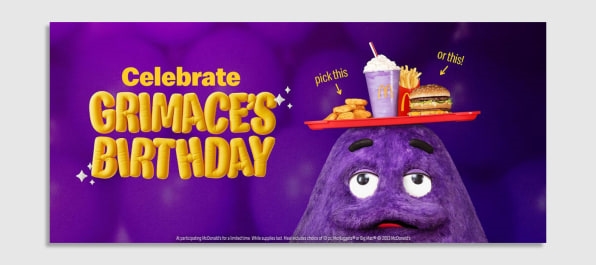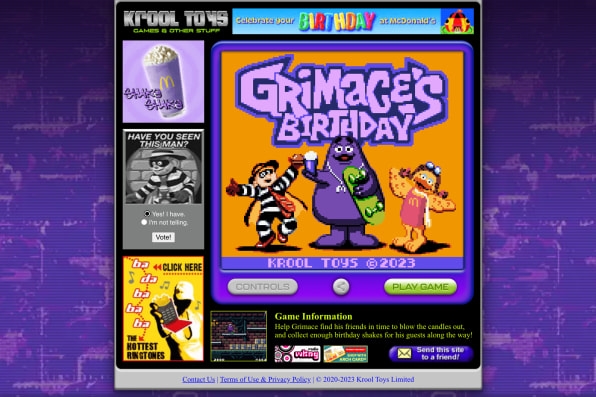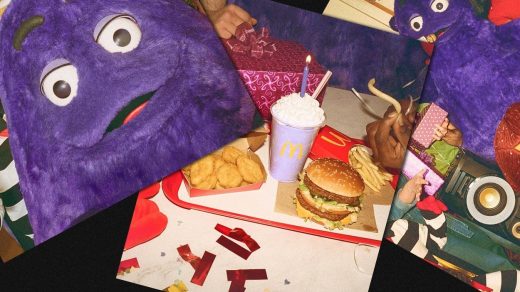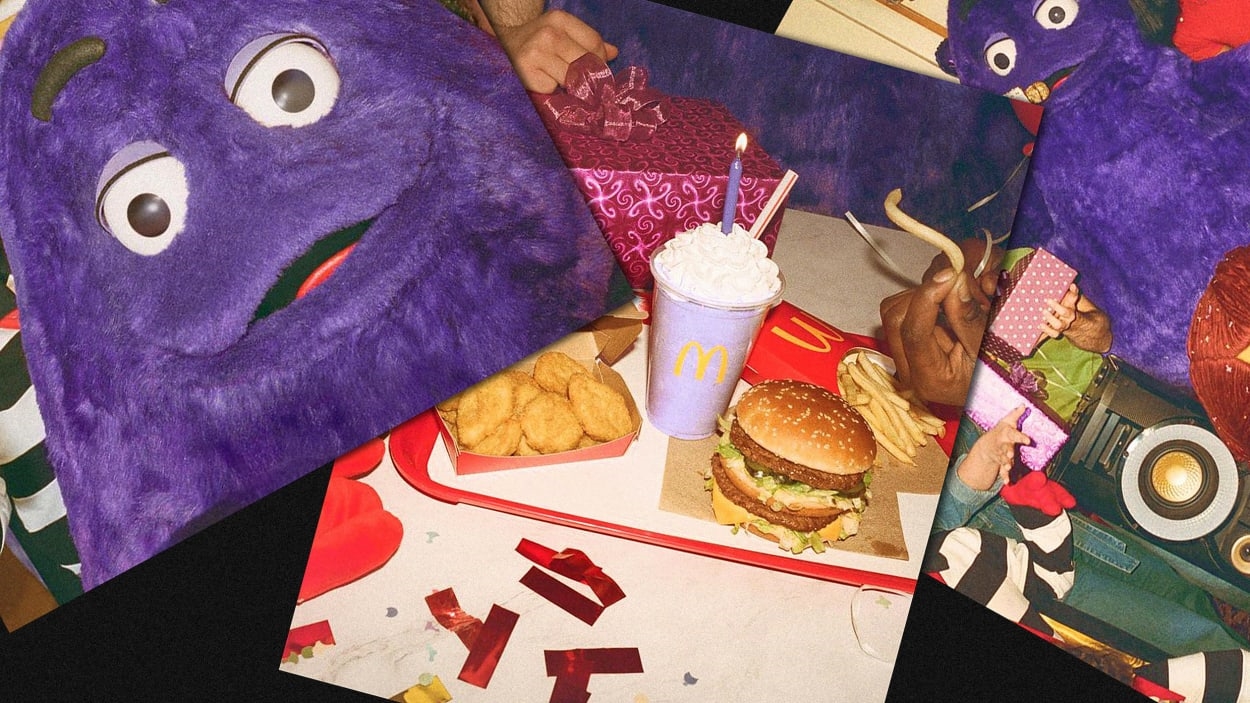McDonald’s Grimace shake taps into the secret of nostalgia marketing
Branded is a weekly column devoted to the intersection of marketing, business, design, and culture.
Summer is always a good time for nostalgic vibes, and McDonald’s is a brand that regularly deploys the nostalgia card, often successfully. But the limited release of a purple shake as part of a Grimace Birthday Meal seems particularly suited to a moment when ridiculous escapism sounds appealing.
The release and extensive feel-good-news coverage of the Grimace special (a Happy Meal variation with a purple drink, marking the blobby character’s 52nd year) coincided with the depressing spectacle of a former president’s arraignment on federal criminal charges. So even Axios, better known for obsessive political scoops, covered the Grimace shake release, positioning it as in tune with nostalgic throwback manias sweeping through the culture in the form of, for example, the new Little Mermaid reboot, and forthcoming Barbie movie, “stirring up memories as they fill corporate cash registers.”

It’s certainly true that McDonald’s cleverly panders to the kid in all of us (especially those who have actual kids) with promotions that tap into its past, and quite possibly your childhood. The chain pretty much said the quiet part out loud when it offered adult Happy Meals—technically a “boxed meal” called the Cactus Plant Flea Market Box, with your choice of toy from the Cactus Plant streetwear brand—for a limited time last year.
But reviving Grimace isn’t simply about revisiting the past. The real key to a nostalgia maneuver is linking it to some current hook or novelty—the whole Barbie summer phenomenon is about tweaking a familiar classic to contemporary aesthetics and celebrities. That’s why McDonald’s has successfully linked variations of its long-familiar meal deals to celebrities from BTS to Cardi B and Offset.
In this case, the Grimace shake is reportedly the chain’s first purple shake—surely Instagram and TikTok bait. (This specific weird color may be novel but may also remind some of limited-time green Shamrock Shakes, which at one point, were promoted by . . . Grimace’s green Uncle O’Grimacy.)
More recently, McDonald’s revived another character from its commercial past, the Hamburglar, to promote changes to its signature burgers. Like Grimace, the Hamburglar was part of a McDonaldland Marketing Universe built around mainstay spokesclown Ronald McDonald in the early 1970s. Others included Officer Big Mac and Mayor McCheese (each with a burger-shaped head) and the Fry Kids. A high fantasy world at the time, it now reads, in abstract memory, as an innocent escape to a less complicated reality.
Actually, that’s particularly true of Grimace, who today seems an icon of the indistinct, blameless innocence of an idealized past. As part of the Grimace shake promotional blitz, McDonald’s also released a Grimace’s Birthday online/mobile game (a version of which even runs on the itself-nostalgic Game Boy Color handheld console from the late 1990s) with shamelessly retro graphics.

Grimace is the perfect ad icon for a crude digital rendering because his appeal is tied up in ambiguity. “Grimace lore says he is the embodiment of a milkshake or a taste bud,” McDonald’s itself once said. More recently it’s been even less equivocal: “What exactly is Grimace? Perhaps we’ll never know.” The Grimace shake, which has already inspired a wave of (mixed) online commentary, is described only as “berry” flavored, and inspired by the character’s color and “sweetness.”
Given that this sweetness is exactly what makes the genial lump such an ideal addition to an escapist-retro summer menu, it’s perhaps worth noting Grimace’s history. He actually debuted as a somewhat grotesque McDonaldland villain—literally, Evil Grimace—who stole shakes and soft drinks. But he was soon rehabilitated into a guileless mascot that the brand has revived regularly over the decades. In 2002, for example, he costarred in a spot touting the chain’s menu of $1 items—with Donald Trump.
At the time, Trump was essentially a tabloid figure past his prime, playing the role of a successful businessman (despite a notorious string of bankruptcies) jokily impressed by Grimace’s burger-deal acumen. The spot ends with Trump and the silent purple blob surveying New York, with Trump speculating that by teaming up, “we could own this town.” In other words, it was a silly ad, highlighting a harmless two-dimensional joke of a character. Plus Grimace.
Two years later, The Apprentice would kick off a new act for Trump, but Grimace has remained constant. True, Stephen Colbert dug up that ad early in the Trump presidency and revised it so that Grimace grills him about Russian connections and other suspicious behavior. But part of the gag is that we all know Grimace is too sweet (and clueless) to do such a thing.
And really, Grimace’s more complicated past is now just a footnote. Nostalgia about, say, the world before the internet, is always more about wishful and wistful thinking than about bygone reality. The shake promotion attracts our attention because a successful nostalgia play isn’t about reliving the actual past—it’s about selectively remembering an idealized one. It’s a way to escape to a place and time that never existed. And that sounds pretty appetizing right now.
(14)



